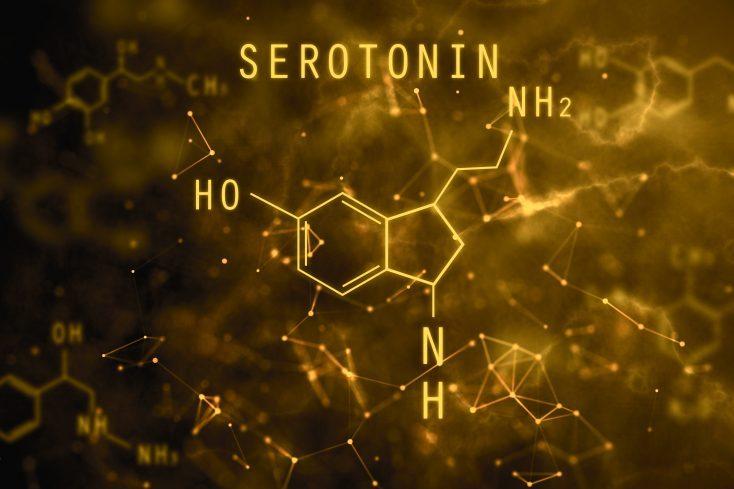There are thousands of neurotransmitters (brain chemicals) at work in your brain, constantly being released via neural pathways created by axons and special branches that reach out from your brain cells like tree limbs called dendrites. About 10% of your neurotransmitters are in charge of some of the most significant aspects of your daily life, and among those is serotonin.
Serotonin, otherwise known by its scientific name as 5-hydroxytryptamine or 5-HT, is most significantly linked to your mood. Without enough of it, you’re prone to depression and anxiety. Depressed people almost across the board also show up with low serotonin levels in lab results, as well as a depleted myelin sheath around their brain cells. This is a fatty layer that helps protect your neurons and allows them to receive neurochemical signals.
Serotonin also helps to regulate your sleep cycles, your hunger (or the suppression of it), and helping your smooth muscles constrict so that you can walk or run a marathon. Without enough serotonin, you’ll also suffer from severe insomnia because it is a precursor molecule for the creation of melatonin – the hormone that allows you to calm down and sleep soundly. Serotonin can even cause memory issues and cognitive decline if there isn’t enough of it in your body and brain.
Oddly, about 90% of your serotonin isn’t made in your brain, but in your gut. So, gut health is key to make sure that you are creating enough of it because a specific set of helpful gut microbes help to create it. [1]
This leads to the number one way to increase serotonin levels naturally, but there are more.
Sadly millions of people are currently taking SSRIs, prescription drugs also known as selective serotonin reuptake inhibitors to try to alter their serotonin levels to treat depression and anxiety. There are several ways that this can be done completely naturally, though!
- Eat foods that contain probiotics, and eat plenty of polyphenols because these act as food for healthy gut bacteria which can help increase both serotonin and dopamine levels in your body. Polyphenols can be found in grape skins, as well as brightly colored foods like blueberries or pomegranate. To reduce sugar levels from consuming too much fruit though, you can also supplement.
- Get plenty of exercise. Daily, moderate exercise will help to boost serotonin levels. You don’t have to overdo it. Just get your heart rate up or try weight lifting. Cardiovascular exercise or building muscle each create more serotonin and increase neuroplasticity to boot. [2]
- Increase your healthy Omega 3 fatty acids, particularly DHA. Your brain and gut love healthy fats. Stay away from processed vegetable oils that have to go through a chemical process, but eat plenty of avocado, coconut and coconut oil, Extra Virgin olive oil, hemp seeds, nuts, and seeds that are high Omega 3s. You can also supplement with a seaweed derived DHA supplement and stay vegan or vegetarian. [3] You need these healthy fats as well to protect the fatty layer that surrounds your neurons. [4]
- Listen to happy music. Listening to uplifting or positive music can boost serotonin levels and make your more creative, too. [5]
- Spend time in nature. Nature has an amazing way of boosting lots of our important neurotransmitters like GABA, serotonin, dopamine, and oxytocin just for starters. Walk outside in the forest, swim in the ocean or get to your nearest park at least once daily.
- Spend time in sunlight. The sun has some unexplored ways of raising important neurotransmitters like serotonin. Scientists are still trying to figure out why the sun affects our neurochemical hormones, but try to get at least 20 minutes of real sunlight daily without sunscreen or sunglasses on. [6]
- Eat more tryptophan. This is a precursor to serotonin. You can find plant sources in pumpkin seeds, pineapple and nuts like Brazil nuts, Pecans, and Walnuts.
- Get adequate co-factors. Adequate amounts of co-factors that support serotonin are best obtained by taking therapeutic doses of magnesium, zinc, folic acid, vitamins C and B6. This will also limit gastrointestinal distress that is often caused by taking pharmaceutical drugs that are meant to increase serotonin levels, but that can cause gastrointestinal distress as a side effect, among other negative health consequences. [7]
Try some of these serotonin boosting tricks today and enjoy better sleep, less anxiety and an elevated mood as well as a clear mind and a positive outlook.
[1] Martín, R., Miquel, S., Ulmer, J., Langella, P., & Bermúdez-Humarán, L. (2014). Gut ecosystem: how microbes help us. Beneficial Microbes, 5(3), 219-233. doi:10.3920/bm2013.0057
[2] Schmidt, G. J. (1989). AEROBIC EXERCISE EFFECT ON FUNCTIONAL AEROBIC CAPACITY AND PLATELET SEROTONIN CONCENTRATION OF INDIVIDUALS WITH AUTISM. Medicine and Science in Sports and Exercise, 21(Supplement), S107. doi:10.1249/00005768-198904001-00640
[3] ‘Brain Food’ Boosts Neurotransmitters. (1978). Science News, 113(6), 85. doi:10.2307/3962740
[4] Bachelin, C. (2005). Efficient myelin repair in the macaque spinal cord by autologous grafts of Schwann cells. Brain, 128(3), 540-549. doi:10.1093/brain/awh406
[5] Happy music boosts creativity. (2017). New Scientist, 235(3143), 17. doi:10.1016/s0262-4079(17)31814-6
[6] Mosienko, V., & Alenina, N. (2019). Life Without Brain Serotonin. Serotonin, 405-420. doi:10.1016/b978-0-12-800050-2.00020-6
[7] The Only Two Ways to Raise Brain Serotonin Levels. (2018, December 17). Retrieved from https://www.ihealthtube.com/content/only-two-ways-raise-brain-serotonin-levels

